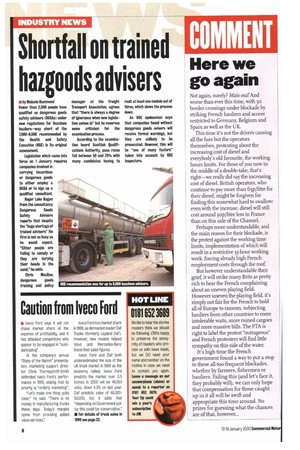Shortfall on trained hazgoods advisers
Page 10

If you've noticed an error in this article please click here to report it so we can fix it.
.) by Melanie Hammond
Fewer than 2000, people have qualified as dangerous goods safety advisers (DGSAs) under new regulations for Hazchem hauliers—way short of the 7,000-9,000 recommended by the Health and Safety Executive (HSE) In Its original assessment.
Legislation which came into force on 1 January requires companies involved in carrying hazardous or dangerous goods to either employ a NSA or to sign up a qualified consultant.
Roger Lake Kagan from the consultancy Dangerous Goods Safety Advisers reports that despite the "huge shortage of trained advisers" his firm is not as busy as he would expect. "Either people are failing to comply or they are burying their heads in the sand." he adds.
Chris MacRae, dangerous goods training and policy manager at the Freight Transport Association, agrees that "there is always a degree of ignorance when new legislation comes in" but he reserves some criticism for the examination process.
According to the examination board Scottish Qualifications Authority, pass rates fall between 50 and 70% with many candidates having to resit at least one module out of three, which slows the process down.
An HSE spokesman says that companies found without dangerous goods avisors will receive formal warnings, but they are unlikely to be prosecuted. However, this will be ''one of many factors" taken into account by HSE inspectors.




















































































































